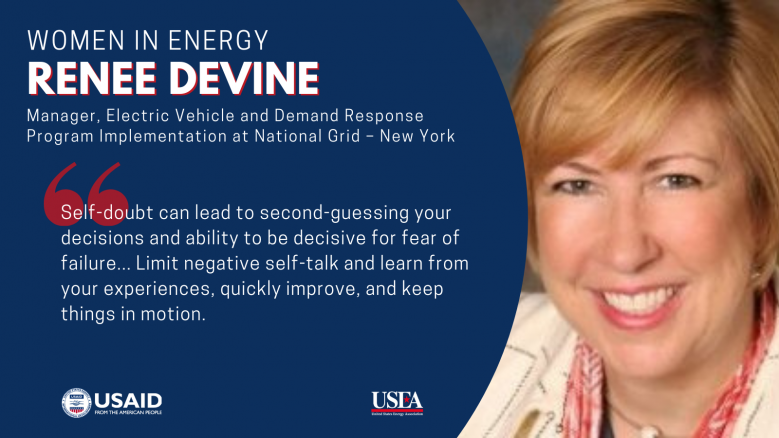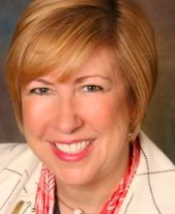
Women In Energy: Renee Devine

The Women in Energy series is a joint project between USEA and USAID that was developed out of USEA’s Engendering Utilities Partnership, a program funded by USAID to improve gender policies and gender outcomes at their respective organizations. Every month we feature a woman who has shown exemplary leadership. The women highlighted come from diverse backgrounds and roles, and they bring with them a unique perspective to gender equality within the energy sector.

May’s Women In Energy honoree is Renee Devine, the manager of National Grid’s New York Electric Vehicles and Demand Response Program implementation team. Renee worked in technical education and program delivery for Monroe Community College and Morrisville Ag & Technical College, where she delivered grant-based and apprenticeship training programs for the skilled trades. She then earned her master’s from University at Albany (SUNY) with concentrations in management information systems and strategic marketing as well as a business administration degree.
Prior to her current management role, Renee led National Grid’s New York Energy Efficiency Large Commercial and Industrial Electric and Gas Savings implementation programs. Forbes has named National Grid one of the “Best Employers for Diversity” in 2020. The company was also recognized as the “Best Place to Work for LGBTQ Equality” by the Human Rights Campaign Foundation in the Corporate Equality Index 2020.
Renee confirms the validity of these accolades: “Now 20 years in, I still feel engaged every day, continue to grow as a leader, continue to learn, and feel proud of the work I deliver as it supports our transition to clean energy and clean transportation… As a woman in energy, the biggest obstacles I have experienced, and at times continue to experience, are self-doubt and overcoming the fear of failure. Most everyone has some sense of doubt, but the key is to make sure that it doesn’t limit your ability to achieve your goals,” Renee said in her interview.
*USEA does not alter the substance of the responses from the women featured. The answers are their own.
How have your education and career path led you to where you are now?
I would describe my educational and career path both scenic and a bit of a windy road. The journey has allowed me great travel opportunities, develop a love for learning new things and allowed me to develop my leadership skills and embrace the field of energy with a focus on sustainability and clean transportation.
Looking back, like many 17 year-olds getting ready for the next phase of my life, I wasn’t sure where college would lead. While I had great role models, I was a bit limited in my imagination, I was concerned about finances, and my part-time high school job seemed to provide me a ready-made career path where I could earn money and gain experience; it was as easy choice. After attending trade school, I completed an apprenticeship and thought I would eventually open my own business. It was the experience of attending trade school, traveling outside my small hometown, and seeing a bit of the world helped me realize there was a lot more life had to offer. That experience motivated me to get outside my comfort zone and pursue college more seriously by any means possible.
Attending college at night, continuing to build my work experience, I grew a network of mentors and maintained a high level of energy, worked extremely hard to deliver value, and had a constant desire to learn and grow. I went from high school to trade school to college, from grad school to early days of dot.com, and from computing into project management in the whole-sale energy markets. Yes, it was a windy path, but that is how I landed in the energy field. Now 20 years in, I still feel engaged every day, continue to grow as a leader, continue to learn, and feel proud of the work I deliver as it supports our transition to clean energy and clean transportation.
What obstacles have you experienced as a woman pursuing an education and career in the energy industry? What obstacles do women vying for leadership spots face in this sector?
As a woman in energy, the biggest obstacles I have experienced, and at times continue to experience, are self-doubt and overcoming the fear of failure. Most everyone has some sense of doubt, but the key is to make sure that it doesn’t limit your ability to achieve your goals. Self-doubt can lead to second-guessing your decisions and ability to be decisive for fear of failure. The idea of not letting perfection be the enemy of progress and failing fast are strategies I employ. I try to ensure that indecisiveness is not a factor that impacts my credibility as a leader. A boss once told me, if you wait for the perfect – the perfect time, the perfect market conditions, the perfect job opportunity, the perfect qualifications, the perfect candidate, etc. – you are wasting valuable time and limiting progress. To not make progress is a missed opportunity to deliver value. Nothing is ever perfect. Limit negative self-talk and learn from your experiences, quickly improve, and keep things in motion.
Technology is transforming the traditional utility business model into a more modern interactive grid. Some utilities view this transformation as an opportunity to focus on innovation and diversity, which research shows drives better business performance. How is your organization attracting, retaining, and promoting more women into senior management positions to respond to this industry transformation? Is company data on this publicly available?
Technology is transforming the traditional utility business model, and this continues to be an opportunity that brings new voices to the table; voices that represent not only the broad geographical customer base we serve but also the broad demographical customer base we serve.
National Grid has received accolades for its efforts in inclusion and diversity. DiversityInc. has ranked National Grid US as one of the top ten utilities and earned “Best Place to Work for LGBTQ Equality” by Human Rights Campaign Foundation in the Corporate Equality Index 2020. Forbes also named National Grid one of the “Best Employers for Diversity” in 2020.
Realizing Inclusion and Diversity (I&D) goes beyond just awards, National Grid believes that I&D needs to be operationalized into the business at both the strategic level as well as the line-level to ensure that it becomes part of the way we do business. While recognition is good and demonstrates progress, there is still more that needs to be achieved in terms of diversity and pay equality.
In the United States, women make up 50 percent of the labor force but currently represents only one-third of National Grid’s board, one-third of senior management, and less than 25 percent of the company’s workforce. Ethnic diversity also needs to be strengthened to meet the changing workforce demographics in the future. Finally, pay policy and pay equity needs to be keep top-of-mind with senior leaders. Hiring for inclusion and diversity at the manager/supervisor level should require a diverse interview panel. As we look to expand outreach efforts, we need to engage our networks and employee resource groups and better align our external networks to pull in women who may have overlooked this sector as a career possibility. National Grid’s goal is to rethink policies and create an environment where individuals feel valued, respected, and fairly treated.
What changes in the sector at large do you think have launched more women into leadership positions?
To get more women in leadership positions, women need to see it, to believe it, to achieve it! As a sector, we must continue to promote women, engage them as mentors and role models to younger women so we build a pipeline of talent who will serve as the next generation of leaders. From line-workers, gas mechanics, supervisors, managers, and directors, all the way to the boardroom and at every level in between. We need women to apply for roles and signal their willingness to take on those roles whether they be in the field or in the boardroom.
What are some untapped actions the energy and electricity sector could focus on to accelerate change, increase diversity, and foster a better gender balance in the boardroom?
As an industry, we need to demystify energy, become better story tellers, and demonstrate the value the energy sector provides society and its vital role in helping achieve our clean energy targets. When people flick the switch for lights or turn up the heat, they need to understand what is behind the electronic component, the people, the systems, and the policies that make this whole thing work. They need to know who the people, the different jobs, the different market players, the engineering, the math and maps, public finance, real-estate, pipefitting, the customer advocates, and all that we do as an industry to bring energy to life. I think women gravitate toward roles where they feel that can help people and can make a difference. Therefore, we need to tap into our collective “whys” to help explain how we make that difference for our customers. Whether that be a small business who wants to have customers shop longer and provide an EV charger at her store, to the chip-fab manufacturer who needs power quality, to a single mom who needs help selecting a clean reliable furnace and whether it’s economics or environment, we need to tell stories that matter. When you get to a person’s why, give them a reason, tell a story that resonates with them, it gives them purpose and engages them with a passion for the job they do and the career they choose.
